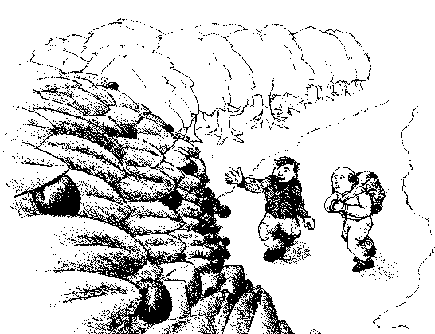This story happened very long ago, at a time when people lived much longer lives, even 10,000 years! After King Fruitful had ruled for about 7,000 years, it just so happened that the royal gardener brought him an especially wonderful collection of fruits and flowers. He liked them so much that he wanted to see the garden. So the gardener arranged and decorated the garden, and invited him to visit.
The king set out on a royal elephant, followed by the entire court and many of the ordinary people of Mithila. When he entered through the garden gate he saw two beautiful mango trees. One was full of perfectly ripe mangoes, while the other was completely without fruit. He took one of the fruits and enjoyed its delicious sweet taste. He decided to eat more of them on his return trip.
When the people saw that the king had eaten the first fruit, they knew it was all right for them to eat. In no time at all the mangoes had been eaten. When the fruits were gone, some even broke the twigs and stripped the leaves looking for more.
When King Fruitful returned he saw that the tree was stripped bare and nearly destroyed. At the same time, the fruitless tree remained as beautiful as before, its bright green leaves shining in the sunlight.
The king asked his ministers, “What has happened here?" They explained, “Since Your Majesty ate the first fruit, the people felt free to devour the rest. Searching for more fruits they even destroyed the leaves and twigs. The fruitless tree was spared and remains beautiful since it has no fruit."
This saddened the king. He thought, “This fruitful tree was destroyed, but the fruitless one was spared. My kingship is like the fruitful tree —- the more the power and possessions, the greater the fear of losing them. The holy life of a simple monk is like the fruitless tree —- giving up power and possessions leads to freedom from fear."
So the Great Being decided to give up his wealth and power, to leave the glory of kingship behind, to abandon the constant task of protecting his position. Instead he decided to put all his effort into living the pure life of a simple monk. Only then could he discover lasting deep happiness, which would spread to others as well.
He returned to the city. Standing next to the palace gate, he called for the commander of the army. He said, “From now on, no one is to see my face except a servant bringing food and a servant bringing water and toothbrush. You and the ministers will rule according to the old law. I will live as a simple monk on the top floor of the palace."
After he had lived for a while in this way, the people began to wonder about the change in him. One day a crowd gathered in the palace courtyard. They said, “Our king is not as he was before. He no longer wants to see dancing or listen to singing or watch bull fights and elephant fights or go to his pleasure garden and see the swans on the ponds. Why does he not speak to us?" They asked the servants who brought the king his food and water, “Does he tell you anything?"
They said, “He is trying to keep his mind from thinking about desirable things, so it will be peaceful and wholesome like the minds of his old friends, the Silent Buddhas. He is trying to develop the purity of the ones who own nothing but good qualities. Once we even heard him say out loud, “I can think only of the Silent Buddhas, free from chasing ordinary pleasures. Their freedom makes them truly happy — who will take me to where they live?"
King Fruitful had been living on the top floor of the palace trying to be a simple monk for only about four months. At that point he realised there were too many distractions in the beautiful kingdom of Mithila. He saw them as only an outer show keeping him from finding inner peace and Truth. So he decided, once and for all, to give up everything and become a forest monk and go live in the Himalaya Mountains.
He had the yellow robes and begging bowl of a monk brought to him. He ordered the royal barber to shave his head and beard. Then early the next morning, he began walking down the royal staircase.
Meanwhile Queen Sivali had heard about his plans. She gathered together the 700 most beautiful queens of the royal harem and took them up the staircase. They passed King Fruitful coming down, but didn’t recognise him dressed as a monk. When they got to the top floor, Queen Sivali found it empty, with only the king’s shaven hair and beard still there. Instantly she realised the unknown monk must be her husband.
All 701 queens ran down the stairs to the palace courtyard. There they followed the king-turned-monk. As Queen Sivali had instructed them, they all let down their hair and tried to entice the king to stay. They cried and cried, pleading with him, “Why are you doing this?" Then all the people of the city became very upset and began following him. They were weeping as they cried out, “We have heard that our king has become a simple monk. How can we ever find such a good and fair ruler again?"
The 700 harem queens, wearing all their lovely veils and rich jewellery, crying and begging, did not change the mind of the Enlightenment Being. For he had made his decision and was determined to stick to it. He had given up the gold anointing bowl of state, which had passed the power of the royal family to him. Instead he now carried only the plain clay-begging bowl of a humble monk, a seeker of Truth.
Finally Queen Sivali stopped crying. She saw that the beautiful queens from the harem had not stopped her husband. So she went to the commander of the army. She told him to set a fire among the slum houses and abandoned buildings that were in the king’s path. She told him to set fires of brush and wet leaves in different areas of the city, to make a lot of smoke.
When this was done she fell to the ground at the king’s feet and cried, “All Mithila is burning, my lord! The beautiful buildings with their valuable art works, precious metals and jewels, and treasures are all being destroyed. Return, oh king, and save your riches before it is too late."
But the Enlightenment Being replied, “All these things belong to others. I own nothing. So I’m not afraid of losing anything. And losing things can’t make me sad. My mind is at peace."
Then he left the city through the northern gate, still followed by all 701 queens. According to Queen Sivali’s instructions, they showed him villages being robbed and destroyed. There were armed men attacking, while others seemed wounded and dead. But what looked like blood was really just red dye, and the dead were only pretending. The king knew it was a trick, since there were no actual robbers and plunderers in the kingdom in the first place.
After walking still farther, the king stopped and asked his ministers, “Whose kingdom is this?" “Yours, oh lord," they said. “Then punish any who cross this line," he ordered, as he drew a line across the road. No one, including Queen Sivali, dared to cross the line. But when she saw the king continuing on down the road, with his back to her, she was grief-stricken. Beating her breast she fell across the line. Once the line was crossed, the whole crowd lost its fear and followed her.
Queen Sivali kept the army with her as the entire crowd kept following King Fruitful. He continued for many miles, heading for the Himalayas in the north.
Meanwhile, there was a very advanced monk named Narada, who lived in a golden cave in the Himalayas. He was a very wise man. By great mental effort he had gained supernatural powers that only the highest holy men are said to have. After meditating in a wonderful trance for a full week he suddenly shouted, “What happiness! Oh what happiness!"
Then, using his special powers, he looked out over all India to see if there was anyone who was sincerely seeking that same happiness, free of all the distractions of the world. He saw only King Fruitful, the Bodhisatta who would some day become the Buddha. He saw that he had given up all his earthly power. And yet he was still blocked, still hindered by the obstacle of the crowd following him from his previous worldly life. In order to help and encourage him, he magically flew through the air and floated in front of the king.
He asked King Fruitful, “Oh monk, why is this crowd with all its noise following you?" The king replied, “I have given up the power of kingship and left the world for good. This is why my former subjects follow me, even though I leave them happily."
The holy monk said, “Don’t be too confident, oh monk. You haven’t succeeded in leaving the world quite yet. For there are still obstacles inside of you. These are the ‘Five Hindrances’ — the desire for ordinary pleasures of sight, sound and so forth; the desire to harm others; laziness; nervous worrying; and unreasonable doubts. Therefore, practice the Perfections, be patient, and don’t think either too much or too little of yourself."
He finished by saying, “I give you my blessing — may goodness, knowledge and Truth protect you on your way." Then he disappeared and reappeared back in his golden cave.
Due to this wise advice, King Fruitful became even less concerned with the crowd outside, realising that the greatest obstacles, or hindrances, are the ones inside.
Meanwhile Queen Sivali fell at his feet once again. She pleaded, “Oh king, hear the wails of your subjects. Before leaving them for good, comfort them by crowning your son to rule in your place."
He replied, “I have already left my subjects, friends, relatives and my country behind. Have no fear, the nobles of Mithila have trained Prince Longlife well, and they will protect and support you both."
She continued, “Oh king, by becoming a monk you are leaving me without a husband. What a shame! What am I to do?"
He said, “Only be careful to teach the prince no unwholesome thoughts, words or deeds. Otherwise you would bring painful results to yourself."
As the sun set, the queen made camp while the king went into the forest to sleep at the foot of a tree. The next day she continued to follow him, bringing the army with her. They approached a small city.
It just so happened that a man in the city had bought a fine piece of meat from a butcher. After cooking it he placed it on a table to cool, when a stray dog grabbed it and ran off. The man followed the dog as far as the southern gate of the city. There he gave up because he was too tired to continue.
The escaping dog crossed the path of King Fruitful and Queen Sivali. Frightened by them, he dropped the meat on the road. The king saw that it was a good piece of meat and that the real owner was unknown. So he cleaned the meat, put it in his begging bowl, and ate it.
Queen Sivali, who was used to eating the delicacies of the palace, was disgusted. She said to him, “Even at the point of death a high class person would not eat the leavings of a dog! Eating such disgusting food shows you are completely unworthy!" But he replied, “It is your own vanity that keeps you from seeing the value of this meat. If rightfully obtained, all food is pure and wholesome!"
As they continued to approach the city, King Fruitful thought, “Queen Sivali keeps following me. This is a bad thing for a monk. People say, ‘He has given up his kingdom, but he can’t get rid of his wife!’ I must find a way to teach her she must go."
Just then they came upon some playing children. Among them was a girl with one bracelet on one wrist and two on the other. Thinking she was a wise child, the king asked her, “My child, why does your one arm make noise with every movement, while the other does not?"
The little girl replied, “Oh monk, it’s because on one arm there are two bracelets, while on the other there is only one. Where there are two, it’s the second that clangs against the first and makes noise. The arm with only one bracelet remains silent. So if you would be happy, you must learn to be contented when alone."
The Bodhisatta said to the queen, “Do you hear the wisdom of this child? As a monk, I would be ashamed to let you stay with me in front of her. So you go your way and I’ll go mine. We are husband and wife no more – good-bye!"
The queen agreed and they took separate paths. But she became grief-stricken again and returned to follow the king. They entered the city together, so he could collect alms food.
They came to the house of an arrow maker. They watched him wet the red-hot arrow, and straighten it while sighting down the shaft with only one eye open. The king asked him, “Friend, to make the arrow perfectly straight, why do you view it with one eye open and the other shut?"
The arrow maker answered, “With both eyes open, the wide view of the second eye is distracting. Only by concentrating my view in one eye can I truly see the straightness of the arrow. So if you would be happy, you must learn to be contented when alone."
The king collected alms food and then they left the city. He said to the queen, “Did you hear the same wisdom again from that craftsman? As a monk, I would be ashamed to let you stay with me in front of him. So you go your way and I’ll go mine. We are husband and wife no more – good-bye!" But still she followed him.
Then the Great Being cut a stalk of tall grass. He said to Queen Sivali, “Just as the two pieces of this stalk of grass cannot be joined again, so I will not join you again in the marriage bed! We two can never be joined together again. Like a full stalk of uncut grass, live on alone, my ex-wife Sivali."
On hearing this the queen went crazy with shock and grief. She beat herself with both hands until she fell to the ground — completely unconscious. Realising this, the Bodhisatta quickly left the roadway. He erased his footsteps and disappeared into the jungle.
First he had given up the power and wealth of a king. Now he had given up the power and desire of a husband. At last he was free to follow the path of a Truth-seeking wandering monk. He made his way to the Himalayas and in only one week he was able to develop special mental powers. Never again did he return to the ordinary world.
Meanwhile the royal ministers, who had been following at a distance, reached the fainted queen. They sprinkled water on her and revived her. She asked, “Where is my husband the king?" They said, “We don’t know. Don’t you know?" In a panic she ordered, “Search for him!" They looked and looked, but of course he was gone.
When Queen Sivali recovered from her fear and grief, she realised she felt no anger, jealousy or vengeance towards the monk Fruitful. Instead she admired him more than at any time since the day they met, when she gave him her hand and led him to the throne.
She had monuments erected to honour the courageous King Fruitful on four sites: where he had spoken with the floating holy man Narada, where he had eaten the good meat left by the dog, where he had questioned the little girl, and also the arrow maker.
Beside the two mango trees in the royal garden, she had Prince Longlife crowned as the new king. Together with the army and crowds of followers, they returned to the city of Mithila.
In spite of herself, Queen Sivali had learned something by following, and finally losing, her husband King Fruitful. She too had tasted freedom!
The wise lady gave up her royal duties. She retired to meditate in the garden by the mango trees. With great effort, she gained a high mental state leading to rebirth in a heaven world.
The moral is: It’s easier to gain power than to give it up.
Link:https://hhdorjechangbuddhaiiiinfo.com/2023/09/05/52-539-king-fruitful-and-queen-sivali-chapter-3-giving-up-power/
#Buddhisttalesforyoungandold #Buddhiststories #storiesforkids #moralstories #Buddha #Jatakastories #PansiyaPanasJataka



